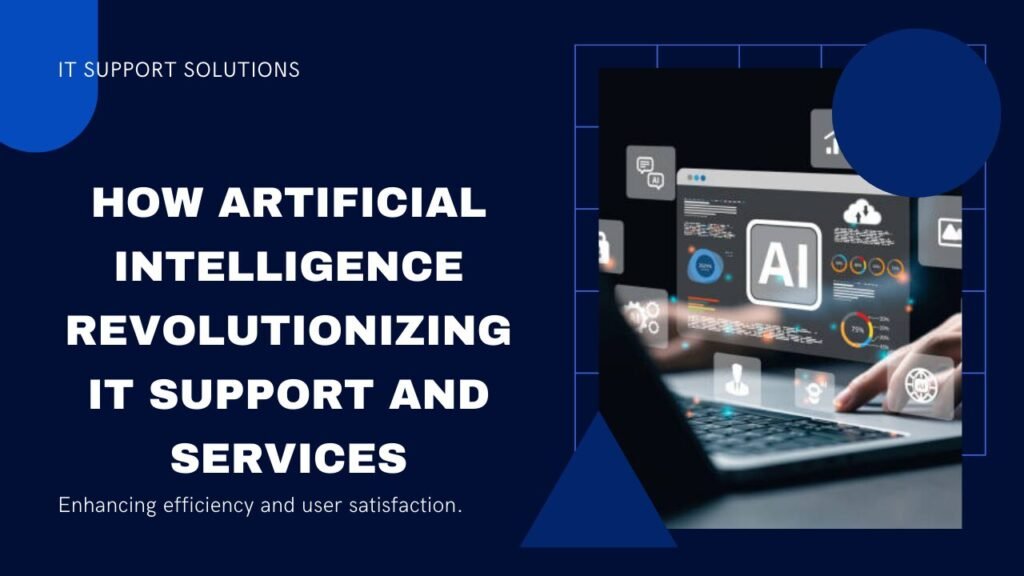Artificial Intelligence (AI) is no longer a futuristic concept; it’s a transformative technology reshaping various industries, including IT support and services. From automating routine tasks to providing advanced analytics and improving customer experiences, AI is revolutionizing the way IT departments operate. Here’s a look at how AI is making a significant impact on IT support and services.
1. Automating Routine Tasks
One of the most significant advantages of AI in IT support is its ability to automate repetitive and mundane tasks. This not only saves time but also reduces the likelihood of human error.
Key Innovations:
- Automated Ticketing Systems: AI can automatically categorize, prioritize, and route support tickets to the appropriate departments, ensuring faster response times.
- Self-Healing Systems: AI-driven systems can identify and resolve common issues without human intervention, such as rebooting servers or applying software patches.
- Chatbots and Virtual Assistants: AI-powered chatbots can handle a wide range of customer inquiries, providing instant support and freeing up human agents for more complex issues.
2. Enhancing Problem Resolution
AI’s advanced problem-solving capabilities enable it to diagnose and resolve issues more efficiently than traditional methods.
Key Innovations:
- Predictive Analytics: AI can analyze patterns and predict potential system failures before they occur, allowing for proactive maintenance and reducing downtime.
- Root Cause Analysis: AI tools can quickly analyze vast amounts of data to identify the root cause of issues, leading to faster and more accurate resolutions.
- Knowledge Management: AI can organize and retrieve information from vast knowledge bases, providing IT support teams with quick access to solutions and best practices.
3. Improving Customer Experience
AI is transforming the customer support experience by providing faster, more personalized, and efficient services.
Key Innovations:
- Personalized Support: AI can analyze user behavior and preferences to offer tailored support solutions, enhancing customer satisfaction.
- 24/7 Availability: AI-powered chatbots and virtual assistants can provide round-the-clock support, ensuring that customers receive assistance whenever they need it.
- Sentiment Analysis: AI can gauge customer emotions through text or speech analysis, allowing support agents to tailor their responses and improve overall customer interactions.
4. Optimizing IT Operations
AI helps optimize IT operations by providing actionable insights and automating complex processes.
Key Innovations:
- Resource Allocation: AI can analyze usage patterns and optimize the allocation of IT resources, ensuring efficient utilization and reducing costs.
- Performance Monitoring: AI-driven monitoring tools can continuously analyze system performance, detect anomalies, and alert IT teams to potential issues before they impact operations.
- Capacity Planning: AI can predict future resource requirements based on historical data, helping IT departments plan for growth and avoid capacity issues.
5. Enhancing Security
Cybersecurity is a critical concern for IT departments, and AI is playing a pivotal role in enhancing security measures.
Key Innovations:
- Threat Detection: AI can analyze network traffic and user behavior in real-time to detect and respond to potential security threats.
- Incident Response: AI-powered tools can automate the incident response process, ensuring swift action to mitigate security breaches.
- Fraud Prevention: AI can identify and flag unusual patterns that may indicate fraudulent activities, providing an additional layer of security for IT systems.
6. Facilitating Remote Work
The rise of remote work has posed new challenges for IT support, and AI is helping to address these challenges effectively.
Key Innovations:
- Remote Troubleshooting: AI tools can assist remote workers by diagnosing and resolving issues without the need for on-site support.
- Collaboration Tools: AI enhances collaboration platforms by providing real-time translations, transcription services, and intelligent meeting summaries.
- Device Management: AI can monitor and manage remote devices, ensuring they are secure and up-to-date with the latest software and patches.
Conclusion
AI is undeniably revolutionizing IT support and services, bringing about significant improvements in efficiency, problem resolution, customer experience, operations optimization, security, and remote work facilitation. By leveraging AI technologies, IT departments can provide faster, more accurate, and more personalized support, ultimately leading to higher levels of customer satisfaction and operational excellence. As AI continues to evolve, its impact on IT support and services will only grow, making it an indispensable tool for businesses looking to stay ahead in the digital age.


